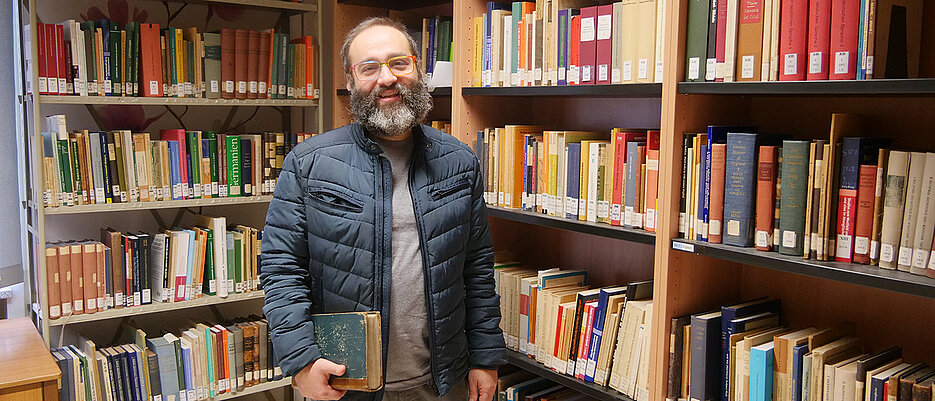Rediscovering Lost History through Linguistics
30.08.2024Guest at the University of Würzburg since December 2024: Dr. Shuan Osman Karim is a linguist and expert on Iranian languages. A Humboldt Fellowship enables him to conduct research under the chair of Professor Daniel Kölligan.

Many people will create a political context for Iran when they read the word “Iranian”. In the media, the term is mainly used when there is something to report about the Middle Eastern state. Linguistics researchers use the word differently in their everyday lives: the Iranian branch of Indo-European languages comprises more than 60 individual languages, most of which are native to the Near East. The area stretches from eastern Turkey through Iran to a peripheral region in the far west of China.
Dr. Shuan Karim deals with some representatives of this language family, which are mainly found in the Kurdish region. Since December 2024, he has been a guest of Professor Daniel Kölligan, Head of the Chair of Comparative Linguistics at Julius-Maximilians-Universität Würzburg (JMU). His stay is made possible by a two-year fellowship from the Alexander von Humboldt Foundation. His project at the JMU is entitled “A historical grammar of Gorani”. This sub-branch of the Iranian languages has around 500,000 speakers in Iraq and Iran.
His research aims to deconstruct a myth: “The Middle East is often portrayed as a perpetual source of conflict, where a few hegemonic groups impose their language, culture and religion on the indigenous people. Reconstructions from linguistic history show that there was a long history of multilingualism in the region. Aramaic-speaking Christians and Jews lived harmoniously together with speakers of Iranian languages; they learned each other's languages and thus had a lasting influence on their culture,” says Karim.
Reconstructing the Earlier Stages of Gorani
Karim's work is based on language variants of the Gorani branch of the Iranian language tree. Even though he conducts his research as a historical linguist, his approach is anything but classical: “Many language historians try to reconstruct the oldest layers of a language. The most famous is the study of Indo-European, which according to some estimates date back to 7000 BC. They are interested in our origins and our homeland. This academic endeavor is noble, but for many of the languages spoken today, we know little about their speakers if we look back several decades ago. I have dedicated my career in linguistics to reconstructing the closer history,” says the scholarship holder.
So he has taken the unorthodox path for a language historian: He focuses on living languages and their speakers. The project requires concentration and attention to detail: “Fortunately, the scholarship allows me to concentrate fully on my work. Professor Kölligan supports me as a mentor. I really appreciate his advice and support,” says Karim.
A Detour to Würzburg
The Humboldt Fellowship brought Karim to JMU in a roundabout way: “Initially, the University of Frankfurt was considered as a research location. However, as my host there, Professor Saloumeh Gholami, moved to Cambridge, I chose Professor Daniel Kölligan's team,” says the linguist. As the two linguists had already met at several conferences and Shuan Karim appreciates Kölligan's work, the decision was easy for him.
About the Linguist
Growing up in Texas, Shuan Karim taught English in Iraq in 2007. There he taught himself Kurdish. Back in the USA, he then pursued a career as a chef. In 2012, he took the plunge into an academic career: he studied linguistics at the Universities of Austin and Ohio and completed his doctorate in 2021. His dissertation is entitled: The synchrony and diachrony of New Western Iranian nominal morphosyntax.
From 2021, the linguist taught introductory linguistics courses at a high school in Columbus, Ohio, for two years. In 2023, he worked as a postdoc on a project funded by the European Research Council at the University of Cambridge until he moved to JMU in December 2024 with an Alexander von Humboldt-Fellowship.






